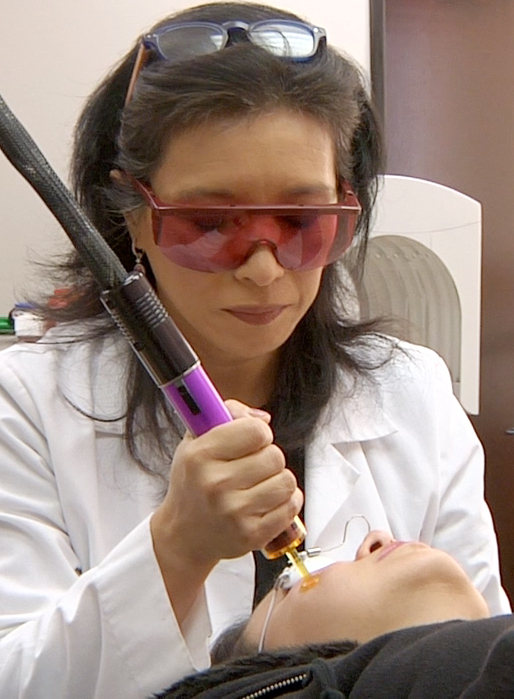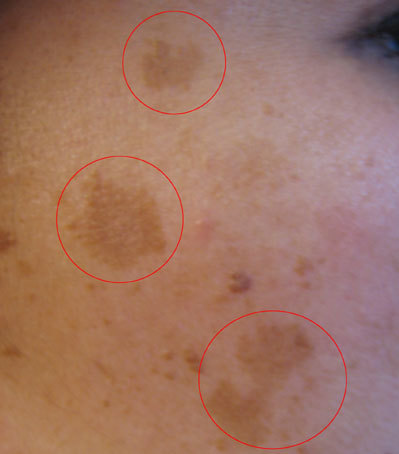|
Melasma
Melasma (also known as chloasma faciei,James, William; Berger, Timothy; Elston, Dirk (2005). ''Andrews' Diseases of the Skin: Clinical Dermatology''. (10th ed.). Saunders. . or the mask of pregnancy when present in pregnant women) is a tan or dark skin discoloration. Melasma is thought to be caused by sun exposure, genetic predisposition, hormone changes, and skin irritation. Although it can affect anyone, it is particularly common in women, especially pregnant women and those who are taking oral or patch contraceptives or hormone replacement therapy medications. Signs and symptoms The symptoms of melasma are dark, irregular, well-demarcated, hyperpigmented macules to patches. These patches often develop gradually over time. Melasma does not cause any other symptoms beyond the cosmetic discoloration. Patches can vary in size from 0.5 cm to larger than 10 cm depending on the person. Its location can be categorized as centrofacial, malar, or mandibular. The most common is c ... [...More Info...] [...Related Items...] OR: [Wikipedia] [Google] [Baidu] |
Pregnancy
Pregnancy is the time during which one or more offspring develops ( gestates) inside a woman's uterus (womb). A multiple pregnancy involves more than one offspring, such as with twins. Pregnancy usually occurs by sexual intercourse, but can also occur through assisted reproductive technology procedures. A pregnancy may end in a live birth, a miscarriage, an induced abortion, or a stillbirth. Childbirth typically occurs around 40 weeks from the start of the last menstrual period (LMP), a span known as the gestational age. This is just over nine months. Counting by fertilization age, the length is about 38 weeks. Pregnancy is "the presence of an implanted human embryo or fetus in the uterus"; implantation occurs on average 8–9 days after fertilization. An ''embryo'' is the term for the developing offspring during the first seven weeks following implantation (i.e. ten weeks' gestational age), after which the term '' fetus'' is used until birth. Signs a ... [...More Info...] [...Related Items...] OR: [Wikipedia] [Google] [Baidu] |
Cysteamine Hydrochloride
Cysteamine is a chemical compound that can be biosynthesized in mammals, including humans, by the degradation of coenzyme A. The intermediate pantetheine is broken down into cysteamine and pantothenic acid. It is the biosynthetic precursor to the neurotransmitter hypotaurine. It is a stable aminothiol, i.e., an organic compound containing both an amine and a thiol functional groups. Cysteamine is a white, water-soluble solid. It is often used as salts of the ammonium derivative SCH2CH2NH3sup>+ including the hydrochloride, phosphocysteamine, and bitartrate. As a medication, cysteamine, sold under the brand name Cystagon among others, is indicated to treat cystinosis. Medical uses Cysteamine is used to treat cystinosis. It is available by mouth (capsule and extended release capsule) and in eye drops. When applied topically it can scavenge free radicals and lighten skin that's been darkened as a result of post-inflammatory hyperpigmentation, sun exposure and Melasma. Tent ... [...More Info...] [...Related Items...] OR: [Wikipedia] [Google] [Baidu] |
Tranexamic Acid
Tranexamic acid (TXA) is a medication used to treat or prevent excessive blood loss from major trauma, postpartum bleeding, surgery, tooth removal, nosebleeds, and heavy menstruation. It is also used for hereditary angioedema. It is taken either orally or by injection into a vein. Mechanism of action Tranexamic acid is a synthetic analog of the amino acid lysine. It serves as an antifibrinolytic by reversibly binding four to five lysine receptor sites on plasminogen. This decreases the conversion of plasminogen to plasmin, preventing fibrin degradation and preserving the framework of fibrin's matrix structure. Tranexamic acid has roughly eight times the antifibrinolytic activity of an older analogue, ε-aminocaproic acid. Tranexamic acid also directly inhibits the activity of plasmin with weak potency ( IC50 = 87 mM), and it can block the active-site of urokinase plasminogen activator (uPA) with high specificity ( Ki = 2 mM), one of the highest among all the serine ... [...More Info...] [...Related Items...] OR: [Wikipedia] [Google] [Baidu] |
Melanocyte
Melanocytes are melanin-producing neural crest-derived cells located in the bottom layer (the stratum basale) of the skin's epidermis, the middle layer of the eye (the uvea), the inner ear, vaginal epithelium, meninges, bones, and heart. Melanin is a dark pigment primarily responsible for skin color. Once synthesized, melanin is contained in special organelles called melanosomes which can be transported to nearby keratinocytes to induce pigmentation. Thus darker skin tones have more melanosomes present than lighter skin tones. Functionally, melanin serves as protection against UV radiation. Melanocytes also have a role in the immune system. Function Through a process called melanogenesis, melanocytes produce melanin, which is a pigment found in the skin, eyes, hair, nasal cavity, and inner ear. This melanogenesis leads to a long-lasting pigmentation, which is in contrast to the pigmentation that originates from oxidation of already-existing melanin. There ... [...More Info...] [...Related Items...] OR: [Wikipedia] [Google] [Baidu] |
Pigment, Biology
Biological pigments, also known simply as pigments or biochromes, are substances produced by living organisms that have a color resulting from selective color absorption. Biological pigments include plant pigments and flower pigments. Many biological structures, such as skin, eyes, feathers, fur and hair contain pigments such as melanin in specialized cells called chromatophores. In some species, pigments accrue over very long periods during an individual's lifespan. Pigment color differs from structural color in that it is the same for all viewing angles, whereas structural color is the result of selective reflection or iridescence, usually because of multilayer structures. For example, butterfly wings typically contain structural color, although many butterflies have cells that contain pigment as well. Biological pigments See conjugated systems for electron bond chemistry that causes these molecules to have pigment. * Heme/porphyrin-based: chlorophyll, bilirubin, hemoc ... [...More Info...] [...Related Items...] OR: [Wikipedia] [Google] [Baidu] |
Azelaic Acid
Azelaic acid (AzA) is an organic compound with the formula HOOC(CH2)7 COOH. This saturated dicarboxylic acid exists as a white powder. It is found in wheat, rye, and barley. It is a precursor to diverse industrial products including polymers and plasticizers, as well as being a component of a number of hair and skin conditioners. AzA inhibits tyrosinase. Production Azelaic acid is industrially produced by the ozonolysis of oleic acid. The side product is nonanoic acid. It is produced naturally by ''Malassezia furfur'' (also known as ''Pityrosporum ovale''), a yeast that lives on normal skin. The bacterial degradation of nonanoic acid gives azelaic acid. Biological function In plants, azelaic acid serves as a "distress flare" involved in defense responses after infection. It serves as a signal that induces the accumulation of salicylic acid, an important component of a plant's defensive response. Applications Polymers and related materials Esters of this dicarboxylic acid f ... [...More Info...] [...Related Items...] OR: [Wikipedia] [Google] [Baidu] |
Retinoid
The retinoids are a class of chemical compounds that are vitamers of vitamin A or are chemically related to it. Retinoids have found use in medicine where they regulate epithelial cell growth. Retinoids have many important functions throughout the body including roles in vision, regulation of cell proliferation and differentiation, growth of bone tissue, immune function, and activation of tumor suppressor genes. Research is also being done into their ability to treat skin cancers. Currently, alitretinoin (9-''cis''-retinoic acid) may be used topically to help treat skin lesions from Kaposi's sarcoma, and tretinoin (all-''trans''- retinoic acid) is used to treat acute promyelocytic leukemia. Types There are four generations of retinoids: * First generation include retinol, retinal, tretinoin (retinoic acid), isotretinoin, and alitretinoin * Second generation include etretinate and its metabolite acitretin * Third generation include adapalene, bexarotene, and tazarote ... [...More Info...] [...Related Items...] OR: [Wikipedia] [Google] [Baidu] |
Tretinoin
Tretinoin, also known as all-''trans'' retinoic acid (ATRA), is a medication used for the treatment of acne and acute promyelocytic leukemia. For acne, it is applied to the skin as a cream, gel or ointment. For leukemia, it is taken by mouth for up to three months. Topical tretinoin is also the most extensively investigated retinoid therapy for photoaging. Common side effects when used as a cream are limited to the skin and include skin redness, peeling, and sun sensitivity. When used by mouth, side effects include shortness of breath, headache, numbness, depression, skin dryness, itchiness, hair loss, vomiting, muscle pains, and vision changes. Other severe side effects include high white blood cell counts and blood clots. Use during pregnancy is contraindicated due to the risk of birth defects. It is in the retinoid family of medications. Tretinoin was patented in 1957, and approved for medical use in 1962. It is on the World Health Organization's List of Essential Medi ... [...More Info...] [...Related Items...] OR: [Wikipedia] [Google] [Baidu] |
Nevus Of Ota
Nevus of Ota is a hyperpigmentation that occurs on the face, most often appearing on the white of the eye. It also occurs on the forehead, nose, cheek, periorbital region, and temple. It was first reported by Masao Ōta of Japan in 1939. Cause Nevus of Ota is caused by the entrapment of melanocytes in the upper third of the dermis. It is found only on the face, most commonly unilaterally, rarely bilaterally and involves the first two branches of the trigeminal nerve. The sclera is involved in two-thirds of cases (causing an increased risk of glaucoma). It should not be confused with Mongolian spot, which is a birthmark caused by entrapment of melanocytes in the dermis but is located in the lumbosacral region. Women are nearly five times more likely to be affected than men, and it is rare among Caucasian people. Nevus of Ota may not be congenital, and may appear during puberty. Skin treatment A Q-switched 1064 nm laser has been successfully used to treat the conditio ... [...More Info...] [...Related Items...] OR: [Wikipedia] [Google] [Baidu] |
Hydroquinone
Hydroquinone, also known as benzene-1,4-diol or quinol, is an aromatic organic compound that is a type of phenol, a derivative of benzene, having the chemical formula C6H4(OH)2. It has two hydroxyl groups bonded to a benzene ring in a ''para'' position. It is a white granular solid. Substituted derivatives of this parent compound are also referred to as hydroquinones. The name "hydroquinone" was coined by Friedrich Wöhler in 1843. Production Hydroquinone is produced industrially in two main ways.Phillip M. Hudnall "Hydroquinone" in Ullmann's Encyclopedia of Industrial Chemistry 2002, Wiley-VCH, Weinheim. 2005 Wiley-VCH, Weinheim. . * The most widely used route is similar to the cumene process in reaction mechanism and involves the dialkylation of benzene with propene to give 1,4-diisopropylbenzene. This compound reacts with air to afford the bis(hydroperoxide), which is structurally similar to cumene hydroperoxide and rearranges in acid to give acetone and hydroquinone. * A ... [...More Info...] [...Related Items...] OR: [Wikipedia] [Google] [Baidu] |
Laser Melasma Treatment
A laser is a device that emits light through a process of optical amplification based on the stimulated emission of electromagnetic radiation. The word "laser" is an acronym for "light amplification by stimulated emission of radiation". The first laser was built in 1960 by Theodore H. Maiman at Hughes Research Laboratories, based on theoretical work by Charles Hard Townes and Arthur Leonard Schawlow. A laser differs from other sources of light in that it emits light which is ''coherent''. Spatial coherence allows a laser to be focused to a tight spot, enabling applications such as laser cutting and lithography. Spatial coherence also allows a laser beam to stay narrow over great distances ( collimation), enabling applications such as laser pointers and lidar (light detection and ranging). Lasers can also have high temporal coherence, which allows them to emit light with a very narrow spectrum. Alternatively, temporal coherence can be used to produce ultrashort pulses of light ... [...More Info...] [...Related Items...] OR: [Wikipedia] [Google] [Baidu] |
Ochronosis
Ochronosis is a syndrome caused by the accumulation of homogentisic acid in connective tissues. The condition was named after the yellowish (ocher-like) discoloration of the tissue seen on microscopic examination. Macroscopically, though, the affected tissues appear bluish-grey because of a light-scattering phenomenon known as the Tyndall effect. The condition is most often associated with alkaptonuria, but can occur from exogenous administration of phenol complexes such as hydroquinone. It was first described by Rudolf Virchow in 1865.Findlay GH, et al. Ochronosis. Clinics in Dermatology 1989;7:28-35 Types The two types of ochronosis are endogenous and exogenous. The endogenous variety is an autosomal-recessive disease, known as alkaptonuria, that is caused by a lack of homogentisate oxidase enzyme.Charlín, R., Barcaui, C. B., Kac, B. K., Soares, D. B., Rabello-Fonseca, R. and Azulay-Abulafia, L. (2008), Hydroquinone-induced exogenous ochronosis: a report of four cases and ... [...More Info...] [...Related Items...] OR: [Wikipedia] [Google] [Baidu] |






